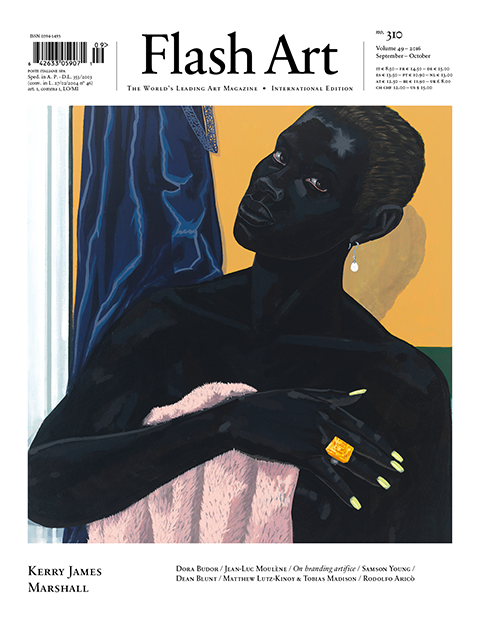 Image 1 of 1
Image 1 of 1


Flash Art
#310 September – October 2016
This issue’s cover reproduces a painting by African American artist Kerry James Marshall, a work that exemplifies the artist’s absorption of pictorial tradition in order to challenge stereotyped representations of blackness in society. On the occasion of his traveling retrospective “Mastry,” opening at the Met Breuer, New York, in October and at MOCA, Los Angeles, in March 2017, the artist talks with Helen Molesworth about the entrenchment of white art discourse within art education and about his experience as a university professor within an academic structure that inhibits nonwhite access. Marshall remarks, “It’s challenging when there are so few students of color in programs so you don’t really get a chance to shape with them the conversation about what kinds of things are possible in making art, but you constantly have to keep doing it with students who already have access to that kind of experience.”
The question of how art explores the possibility of empathy is also addressed by Laura McLean-Ferris in her essay on French artist Jean-Luc Moulène, the subject of a forthcoming retrospective this October at the Centre Pompidou in Paris. In the writer’s words, Moulène’s recent work “allows one to think about both peculiar and important forms of empathy — not a kindly, gentle thought about how someone else might feel; but an attempt to get inside something violent or difficult or alien in the only ways that are available to you.”
#310 September – October 2016
This issue’s cover reproduces a painting by African American artist Kerry James Marshall, a work that exemplifies the artist’s absorption of pictorial tradition in order to challenge stereotyped representations of blackness in society. On the occasion of his traveling retrospective “Mastry,” opening at the Met Breuer, New York, in October and at MOCA, Los Angeles, in March 2017, the artist talks with Helen Molesworth about the entrenchment of white art discourse within art education and about his experience as a university professor within an academic structure that inhibits nonwhite access. Marshall remarks, “It’s challenging when there are so few students of color in programs so you don’t really get a chance to shape with them the conversation about what kinds of things are possible in making art, but you constantly have to keep doing it with students who already have access to that kind of experience.”
The question of how art explores the possibility of empathy is also addressed by Laura McLean-Ferris in her essay on French artist Jean-Luc Moulène, the subject of a forthcoming retrospective this October at the Centre Pompidou in Paris. In the writer’s words, Moulène’s recent work “allows one to think about both peculiar and important forms of empathy — not a kindly, gentle thought about how someone else might feel; but an attempt to get inside something violent or difficult or alien in the only ways that are available to you.”
